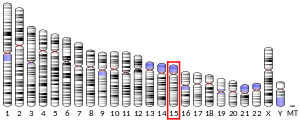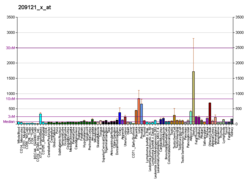COUP-TFII
COUP-TFII (COUP transcription factor 2), also known as NR2F2 (nuclear receptor subfamily 2, group F, member 2) is a protein that in humans is encoded by the NR2F2 gene.[5][6] The COUP acronym stands for chicken ovalbumin upstream promoter.
Function
[edit]COUP-TFII plays a critical role in controlling the development of a number of tissues and organs including heart, blood vessels, muscles and limbs.[7][8]
The glucocorticoid receptor (GR) stimulates COUP-TFII-induced transactivation while COUP-TFII represses the GR transcriptional activity.[9][10] COUP-TFII interacts with GATA2 to inhibit adipocyte differentiation.[11]
Structure and ligands
[edit]The structure of COUP-TF2 LBD is known. Retinoic acid, although not at physiological concentrations, activate this receptor.[12]
Interactions
[edit]COUP-TFII has been shown to interact with:
References
[edit]- ^ a b c GRCh38: Ensembl release 89: ENSG00000185551 – Ensembl, May 2017
- ^ a b c GRCm38: Ensembl release 89: ENSMUSG00000030551 – Ensembl, May 2017
- ^ "Human PubMed Reference:". National Center for Biotechnology Information, U.S. National Library of Medicine.
- ^ "Mouse PubMed Reference:". National Center for Biotechnology Information, U.S. National Library of Medicine.
- ^ "Entrez Gene: NR2F2 nuclear receptor subfamily 2, group F, member 2".
- ^ Qiu Y, Krishnan V, Zeng Z, Gilbert DJ, Copeland NG, Gibson L, Yang-Feng T, Jenkins NA, Tsai MJ, Tsai SY (September 1995). "Isolation, characterization, and chromosomal localization of mouse and human COUP-TF I and II genes". Genomics. 29 (1): 240–6. doi:10.1006/geno.1995.1237. PMID 8530078.
- ^ Pereira FA, Qiu Y, Zhou G, Tsai MJ, Tsai SY (April 1999). "The orphan nuclear receptor COUP-TFII is required for angiogenesis and heart development". Genes Dev. 13 (8): 1037–49. doi:10.1101/gad.13.8.1037. PMC 316637. PMID 10215630.
- ^ Lee CT, Li L, Takamoto N, Martin JF, Demayo FJ, Tsai MJ, Tsai SY (December 2004). "The Nuclear Orphan Receptor COUP-TFII Is Required for Limb and Skeletal Muscle Development". Mol. Cell. Biol. 24 (24): 10835–43. doi:10.1128/MCB.24.24.10835-10843.2004. PMC 533959. PMID 15572686.
- ^ De Martino MU, Bhattachryya N, Alesci S, Ichijo T, Chrousos GP, Kino T (April 2004). "The glucocorticoid receptor and the orphan nuclear receptor chicken ovalbumin upstream promoter-transcription factor II interact with and mutually affect each other's transcriptional activities: implications for intermediary metabolism". Mol. Endocrinol. 18 (4): 820–33. doi:10.1210/me.2003-0341. PMID 14739255.
- ^ De Martino MU, Alesci S, Chrousos GP, Kino T (June 2004). "Interaction of the glucocorticoid receptor and the chicken ovalbumin upstream promoter-transcription factor II (COUP-TFII): implications for the actions of glucocorticoids on glucose, lipoprotein, and xenobiotic metabolism". Ann. N. Y. Acad. Sci. 1024 (1): 72–85. Bibcode:2004NYASA1024...72D. doi:10.1196/annals.1321.006. PMID 15265774. S2CID 20529633.
- ^ Xu Z, Yu S, Hsu CH, Eguchi J, Rosen ED (February 2008). "The orphan nuclear receptor chicken ovalbumin upstream promoter-transcription factor II is a critical regulator of adipogenesis". Proc. Natl. Acad. Sci. U.S.A. 105 (7): 2421–6. Bibcode:2008PNAS..105.2421X. doi:10.1073/pnas.0707082105. PMC 2268152. PMID 18250317.
- ^ Kruse SW, Suino-Powell K, Zhou XE, Kretschman JE, Reynolds R, Vonrhein C, et al. (September 2008). "Identification of COUP-TFII orphan nuclear receptor as a retinoic acid-activated receptor". PLOS Biology. 6 (9): e227. doi:10.1371/journal.pbio.0060227. PMC 2535662. PMID 18798693.
- ^ Smirnov DA, Hou S, Ricciardi RP (March 2000). "Association of histone deacetylase with COUP-TF in tumorigenic Ad12-transformed cells and its potential role in shut-off of MHC class I transcription". Virology. 268 (2): 319–28. doi:10.1006/viro.1999.0181. PMID 10704340.
- ^ Marcus SL, Winrow CJ, Capone JP, Rachubinski RA (November 1996). "A p56(lck) ligand serves as a coactivator of an orphan nuclear hormone receptor". J. Biol. Chem. 271 (44): 27197–200. doi:10.1074/jbc.271.44.27197. PMID 8910285.
- ^ Avram D, Ishmael JE, Nevrivy DJ, Peterson VJ, Lee SH, Dowell P, Leid M (May 1999). "Heterodimeric Interactions between Chicken Ovalbumin Upstream Promoter-Transcription Factor Family Members ARP1 and Ear2". J. Biol. Chem. 274 (20): 14331–6. doi:10.1074/jbc.274.20.14331. PMC 2823254. PMID 10318855.
- ^ Litchfield LM, Riggs KA, Hockenberry AM, Oliver LD, Barnhart KG, Cai J, Pierce WM, Ivanova MM, Bates PJ, Appana SN, Datta S, Kulesza P, McBryan J, Young LS, Klinge CM (May 2012). "Identification and characterization of nucleolin as a COUP-TFII coactivator of retinoic acid receptor β transcription in breast cancer cells". PLOS ONE. 7 (5): e38278. Bibcode:2012PLoSO...738278L. doi:10.1371/journal.pone.0038278. PMC 3365040. PMID 22693611.
External links
[edit]- Human NR2F1 genome location and NR2F1 gene details page in the UCSC Genome Browser.
- Human NR2F2 genome location and NR2F2 gene details page in the UCSC Genome Browser.
- Overview of all the structural information available in the PDB for UniProt: P24468 (COUP transcription factor 2) at the PDBe-KB.
Further reading
[edit]- De Martino MU, Alesci S, Chrousos GP, Kino T (2004). "Interaction of the glucocorticoid receptor and the chicken ovalbumin upstream promoter-transcription factor II (COUP-TFII): implications for the actions of glucocorticoids on glucose, lipoprotein, and xenobiotic metabolism". Ann. N. Y. Acad. Sci. 1024 (1): 72–85. Bibcode:2004NYASA1024...72D. doi:10.1196/annals.1321.006. PMID 15265774. S2CID 20529633.
- Mietus-Snyder M, Sladek FM, Ginsburg GS, Kuo CF, Ladias JA, Darnell JE, Karathanasis SK (1992). "Antagonism between apolipoprotein AI regulatory protein 1, Ear3/COUP-TF, and hepatocyte nuclear factor 4 modulates apolipoprotein CIII gene expression in liver and intestinal cells". Mol. Cell. Biol. 12 (4): 1708–18. doi:10.1128/MCB.12.4.1708. PMC 369614. PMID 1312668.
- Wang LH, Ing NH, Tsai SY, O'Malley BW, Tsai MJ (1992). "The COUP-TFs compose a family of functionally related transcription factors". Gene Expr. 1 (3): 207–16. PMC 5952191. PMID 1820218.
- Ladias JA, Karathanasis SK (1991). "Regulation of the apolipoprotein AI gene by ARP-1, a novel member of the steroid receptor superfamily". Science. 251 (4993): 561–5. Bibcode:1991Sci...251..561L. doi:10.1126/science.1899293. PMID 1899293. S2CID 37214450.
- Marcus SL, Winrow CJ, Capone JP, Rachubinski RA (1996). "A p56(lck) ligand serves as a coactivator of an orphan nuclear hormone receptor". J. Biol. Chem. 271 (44): 27197–200. doi:10.1074/jbc.271.44.27197. PMID 8910285.
- Thénot S, Henriquet C, Rochefort H, Cavaillès V (1997). "Differential interaction of nuclear receptors with the putative human transcriptional coactivator hTIF1". J. Biol. Chem. 272 (18): 12062–8. doi:10.1074/jbc.272.18.12062. PMID 9115274.
- Chu K, Zingg HH (1998). "The nuclear orphan receptors COUP-TFII and Ear-2 act as silencers of the human oxytocin gene promoter". J. Mol. Endocrinol. 19 (2): 163–72. doi:10.1677/jme.0.0190163. PMID 9343308.
- Bailey P, Sartorelli V, Hamamori Y, Muscat GE (1999). "The orphan nuclear receptor, COUP-TF II, inhibits myogenesis by post-transcriptional regulation of MyoD function: COUP-TF II directly interacts with p300 and myoD". Nucleic Acids Res. 26 (23): 5501–10. doi:10.1093/nar/26.23.5501. PMC 147985. PMID 9826778.
- Avram D, Ishmael JE, Nevrivy DJ, Peterson VJ, Lee SH, Dowell P, Leid M (1999). "Heterodimeric Interactions between Chicken Ovalbumin Upstream Promoter-Transcription Factor Family Members ARP1 and Ear2". J. Biol. Chem. 274 (20): 14331–6. doi:10.1074/jbc.274.20.14331. PMC 2823254. PMID 10318855.
- Smirnov DA, Hou S, Ricciardi RP (2000). "Association of histone deacetylase with COUP-TF in tumorigenic Ad12-transformed cells and its potential role in shut-off of MHC class I transcription". Virology. 268 (2): 319–28. doi:10.1006/viro.1999.0181. PMID 10704340.
- Avram D, Fields A, Pretty On Top K, Nevrivy DJ, Ishmael JE, Leid M (2000). "Isolation of a Novel Family of C2H2 Zinc Finger Proteins Implicated in Transcriptional Repression Mediated by Chicken Ovalbumin Upstream Promoter Transcription Factor (COUP-TF) Orphan Nuclear Receptors". J. Biol. Chem. 275 (14): 10315–22. doi:10.1074/jbc.275.14.10315. PMC 2819356. PMID 10744719.
- Jordan EM, Worley T, Breen GA (2003). "Transcriptional regulation of the nuclear gene encoding the alpha-subunit of the mammalian mitochondrial F1F0 ATP synthase complex: role for the orphan nuclear receptor, COUP-TFII/ARP-1". Biochemistry. 42 (9): 2656–63. doi:10.1021/bi0268347. PMID 12614160.
- Sato Y, Suzuki T, Hidaka K, Sato H, Ito K, Ito S, Sasano H (2003). "Immunolocalization of nuclear transcription factors, DAX-1 and COUP-TF II, in the normal human ovary: correlation with adrenal 4 binding protein/steroidogenic factor-1 immunolocalization during the menstrual cycle". J. Clin. Endocrinol. Metab. 88 (7): 3415–20. doi:10.1210/jc.2002-021723. PMID 12843196.
- Colland F, Jacq X, Trouplin V, Mougin C, Groizeleau C, Hamburger A, Meil A, Wojcik J, Legrain P, Gauthier JM (2004). "Functional Proteomics Mapping of a Human Signaling Pathway". Genome Res. 14 (7): 1324–32. doi:10.1101/gr.2334104. PMC 442148. PMID 15231748.
- Kurihara I, Shibata H, Kobayashi S, Suda N, Ikeda Y, Yokota K, Murai A, Saito I, Rainey WE, Saruta T (2005). "Ubc9 and Protein Inhibitor of Activated STAT 1 Activate Chicken Ovalbumin Upstream Promoter-Transcription Factor I-mediated Human CYP11B2 Gene Transcription". J. Biol. Chem. 280 (8): 6721–30. doi:10.1074/jbc.M411820200. PMID 15611122.
- Shibata H, Kobayashi S, Kurihara I, Suda N, Yokota K, Murai A, Ikeda Y, Saito I, Rainey WE, Saruta T (2005). "COUP-TF and transcriptional co-regulators in adrenal steroidogenesis". Endocr. Res. 30 (4): 795–801. doi:10.1081/ERC-200044042. PMID 15666827. S2CID 37921753.







